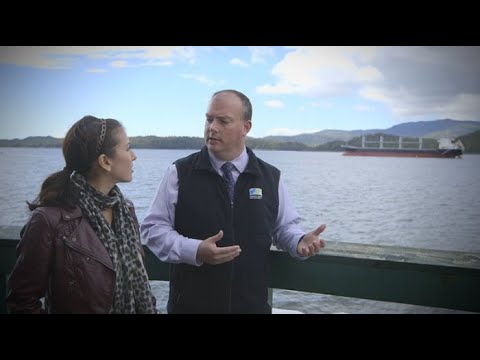Career Overview
Railway traffic controllers coordinate passenger and freight train traffic. Marine traffic regulators monitor and regulate coastal and inland marine traffic within assigned waterways.
Railway traffic controllers work for rail transport companies. Marine traffic regulators work for port, harbour, canal and lock authorities, as well as the Canadian Coast Guard.
Job Titles
Duties
Railway traffic controllers:
- Operate and monitor centralized traffic control systems to coordinate and follow railway traffic
- Chart train movements, calculate arrival and departure times and record rail traffic information
- Give instructions to control the movement of passenger and freight train traffic and on-track mobile maintenance equipment
- Receive, record and relay train instructions to train crew by hand or radio telephone
- May supervise and train other railway traffic controllers
Marine traffic regulators:
- Direct and monitor vessel movements using radar or closed circuit monitors, remote radio systems and other telecommunication equipment
- Get position, course, speed and estimated arrival time of vessels and monitor vessel progress through traffic zone
- Give clearance instructions to vessels, inform vessels of traffic volumes and weather conditions, and relay information to next marine traffic control sector
- Report accidents, distress signals, navigational hazards and other emergencies to authorities
- Maintain radio and telephone contact with adjacent marine control sectors and with vessels within area of jurisdiction
- Maintain log of vessel movements, size and structure
Earnings
Earnings is income that workers receive in exchange for their labour. Depending on the type of employment, earnings can be in the form of wages (hourly), salaries (fixed monthly or annual) or self-employed earnings.
Work Environment
# Workers Employed
215% Employed Full Time
63%Work takes place in a typical controlled environment.
Career Pathways
With experience, railway traffic controllers may progress to supervisory positions in rail transport operations.
There is little movement between traffic controlling occupations in the railway and marine sectors.
Related Careers
Occupational Interests
It’s important to understand what kinds of occupations align with your interests.
For more about occupational interests visit Skills for the Future Workforce > Characteristics.
Here are the top occupational interest(s) for this career profile:
Education, Training and Skills
- Railway traffic controllers usually require completion of secondary school and several years of experience in the railway industry
- Up to 35 weeks of a combination of classroom and on-the-job training is provided for railway traffic controllers
- Railway traffic controllers require a Canadian Rail Operating Rules certificate
- Marine traffic regulators require completion of secondary school and several months of formal traffic regulator training
Education programs in B.C.
The following program areas are related to this occupation:
- Academic/Basic Upgrading

Skills
Every job calls for a certain set of skills. Knowing those skills is the first step in finding a good career fit.
Here, you will find the 10 most relevant workplace skills. Some are more important to achieving success in a certain career than others. These skills may come naturally to you or you may need to gain them through education, training and experience.
See the list of work-related skills below, ranked in order of importance for this career. Check out the list and see if this career matches your skills—take that first step!
Giving full attention to what other people are saying, taking time to understand the points being made, asking questions as appropriate, and not interrupting at inappropriate times.
Talking to others to share information effectively.
Adjusting actions in relation to others' actions.
Keeping track of and assessing your performance, other individuals, or organizations to make improvements or take corrective action.
Understanding written sentences and paragraphs in work-related documents.
Managing one’s own time and the time of others.
Using logic and reasoning to identify the strengths and weaknesses of alternative solutions, conclusions or approaches to problems.
Being able to solve novel, ill-defined problems in complex, real-world settings.
Being aware of others’ reactions and understanding why they react as they do.
Considering the relative costs and benefits of potential actions to choose the most appropriate one.
Labour Market Statistics
Discover data, facts and information that have been gathered and analyzed. Learn about the characteristics of the economy and labour market in B.C.
Employment
Find out about employment types and trends by region and industry.
Employment
215Employment by Region







| Region | Employment | % Employment of this Occupation |
|---|---|---|
| Cariboo | 0 | 0.0% |
| Kootenay | 0 | 0.0% |
| Mainland/Southwest | 150 | 69.8% |
| North Coast and Nechako | 0 | 0.0% |
| Northeast | 0 | 0.0% |
| Thompson-Okanagan | 0 | 0.0% |
| Vancouver Island/Coast | 45 | 20.9% |
Labour Market Outlook
The B.C. Labour Market Outlook is a 10-year forecast of the expected supply and demand for labour in the province. It’s usually updated every year. The purpose is to provide British Columbians with the knowledge to make informed decisions on careers, skills training, education and hiring.
Forecasted Job Openings (2024-2034)
70Forecasted Job Openings
Forecasted Employment Growth Rate
Composition of Job Openings
Job Openings by Region (2024-2034)







| Region | Job Openings | Avg. Annual Employment Growth |
|---|---|---|
| Cariboo | Not available | Not available |
| Kootenay | Not available | Not available |
| Mainland/Southwest | 60 | 0.8% |
| North Coast and Nechako | Not available | Not available |
| Northeast | Not available | Not available |
| Thompson-Okanagan | Not available | Not available |
| Vancouver Island/Coast | 10 | 0.7% |
Industry Highlights
Learn about the opportunities in B.C.'s major industries, including employment trends, earning potential, locations of work and more.
Forecasted Job Openings by Industry
| Industry | Job Openings (2024-2034) |
|---|---|
| Transportation and Warehousing | 60 |
| Public Administration | 10 |
Resources
Resource information is currently not available.









